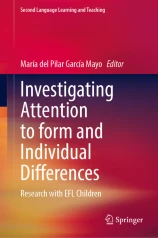Investigating attention to form and individual differences: Research with EFL children
Research into grammar instruction (i.e. interventional efforts to direct learners’ attention to particular grammatical forms) has been a central topic in the field of second language acquisition (SLA) due to its importance in assisting second language (L2) learners to develop communicative competence. Over the last three decades, the role of grammar instruction in second/foreign language contexts has been reconsidered on the basis of findings in the field of second language research with adult learners. Different studies point to the need to identify effective instructional procedures to focus on formal aspects of language that may help learners notice the mismatch between their interlanguage and the target language. Moreover, there is currently a broad consensus that pedagogical intervention is facilitative and may even be indispensable in foreign language (FL) learning contexts as they offer no more than minimal L2 input of a few hours per week. One pedagogical framework proven to be effective for grammar learning is form-focused instruction (FFI). A population that has clearly been underexplored regarding this issue is that of children (ages 6-14) precisely in FL learning contexts. Considering that research on this population should be a priority in coming decades, the main aim of this volume would be to offer a collection of 11 empirical studies that consider pedagogical perspectives to foster the learning of grammar by primary school children and how particular individual differences might have an impact on the process.

